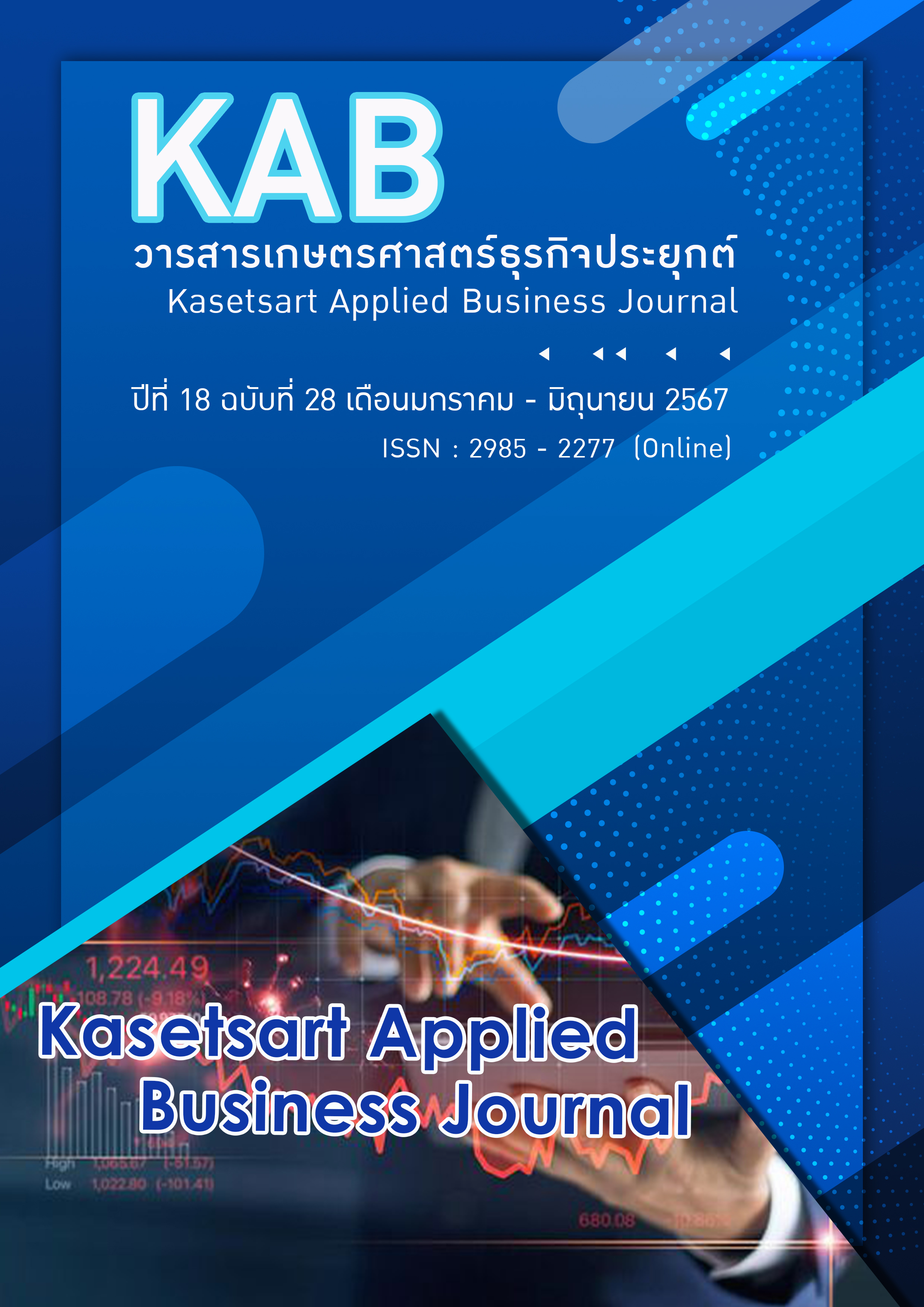ความไม่แน่นอนทางการเมือง การตัดสินใจลงทุนและผลการดำเนินงานของกิจการ: หลักฐานเชิงประจักษ์จากบริษัทจดทะเบียนในตลาดหลักทรัพย์แห่งประเทศไทย
Main Article Content
บทคัดย่อ
งานวิจัยนี้มีวัตถุประสงค์เพื่อศึกษาผลของความไม่แน่นอนทางการเมืองต่อการตัดสินใจลงทุนและผลการดำเนินงานของกิจการ โดยทำการศึกษาข้อมูลรายไตรมาสของบริษัทจดทะเบียนในตลาดหลักทรัพย์แห่งประเทศไทยที่ยังดำเนินงานอยู่ โดยวัดความไม่แน่นอนทางการเมืองด้วยดัชนีระดับความไม่แน่นอนทางการเมืองไทยที่พัฒนาโดย Luangaram and Sethapramote (2018) ผลการศึกษา พบว่า ระดับความไม่แน่นอนทางการเมืองมีผลเชิงลบต่อการตัดสินใจลงทุนของกิจการ และยังมีผลเชิงลบต่อผลการดำเนินงานของกิจการ นอกจากนี้ ยังพบว่า ปัจจัยเฉพาะของกิจการ ได้แก่ ข้อจำกัดทางการเงินที่วัดด้วยกระแสเงินสดจากการดำเนินงานของกิจการ โอกาสในการเติบโตที่วัดจากอัตราการเปลี่ยนแปลงของยอดขายในช่วงเวลาเดียวกันและ Tobin’s Q มีผลเชิงบวกต่อการตัดสินใจลงทุนของกิจการและผลการดำเนินงานอย่างมีนัยสำคัญ ในขณะที่ปัจจัยเชิงเศรษฐกิจมหภาคมีผลต่อการตัดสินใจลงทุนของกิจการแต่มีผลที่ไม่ชัดเจนนักต่อผลการดำเนินงาน โดยสรุป ผลการศึกษาสนับสนุนสมมติฐานที่ว่า ความไม่แน่นอนทางการเมืองส่งผลเชิงลบต่อการเติบโตของเศรษฐกิจผ่านการลดการลงทุนของกิจการในภาคเศรษฐกิจจริง อีกทั้งความไม่แน่นอนทางการเมืองยังส่งผลเชิงลบต่อผลการดำเนินงานของกิจการ
โดยการลดการลงทุนหรือการชะลอการลงทุนของกิจการอาจเนื่องมาจากฝ่ายบริหารรอความชัดเจนของนโยบายที่อาจมีการเปลี่ยนแปลงในช่วงที่มีความไม่แน่นอนทางการเมืองสูง เช่นเดียวกับผู้บริโภคหรือตลาดที่อาจชะลอหรือลดการบริโภคลงในช่วงที่มีความแน่นอนทางการเมืองสูงซึ่งอาจส่งผลกระทบต่อผลการดำเนินงานของกิจการ
Article Details

อนุญาตภายใต้เงื่อนไข Creative Commons Attribution-NonCommercial-NoDerivatives 4.0 International License.
Journal of TCI is licensed under a Creative Commons Attribution-NonCommercial-NoDerivatives 4.0 International (CC BY-NC-ND 4.0) licence, unless otherwise stated. Please read our Policies page for more information...
เอกสารอ้างอิง
พัศวีร์ เจียมสุชน. (2562). ความไม่แน่นอนทางการเมืองและโครงสร้างการเงินของกิจการ [การค้นคว้าอิสระ].มหาวิทยาลัยธรรมศาสตร์. https://digital.library.tu.ac.th/tu_dc/frontend/Info/item/dc:176434
ยุทธนา เศรษฐปราโมทย์. (2564). ผลของปัจจัยเสี่ยงเชิงนโยบายเศรษฐกิจและการเมืองต่อการเติบโตทางเศรษฐกิจและผลตอบแทนตลาดหลักทรัพย์ในประเทศไทย. วารสารเกษตรศาสตร์ธุรกิจประยุกต์, 15(23), 99-120.
An, H., Chen, Y., Luo, D., & Zhang, T. (2016). Political uncertainty and corporate investment: evidence from China. Journal of Corporate Finance, 36, 174-189.
Apaitan, T., Luangaram, P., & Manopimoke, P. (2022). Uncertainty in an emerging market economy: evidence from Thailand. Empirical Economics, 62, 933-989.
Attig, N., Ghoul, S. E., Guedhami, O., & Zheng, X. (2021). Dividends and economic policy uncertainty: International evidence. Journal of Corporate Finance, 66. https://doi.org/10.1016/j.jcorpfin.2020.101785
Azzimonti, M. (2018). Partisan conflict and private investment. Journal of Monetary Economics, 93, 114–131.
Baker, S. R., Bloom, N., & Davis, S. J. (2016). Measuring economic policy uncertainty. The Quarterly Journal of Economics, 131(4), 1593-1636.
Bernanke, B. S. (1983). Irreversibility, uncertainty, and cyclical investment. The Quarterly Journal of Economics, 98(1), 85-106.
Cai, Y., & Menegaki, A. (2021). FDI, growth and trade partisan conflict in the US: TVP-BVAR approach. Empirical Economics, 60, 1335-1362.
Caldara, D., & Iacoviello, M. (2022). Measuring geopolitical risk. American Economic Review, 112(4), 1194-1225. https://doi.org/10.1257/aer.20191823
Caldara, D., Iacoviello, M., Molligo, P., Prestipino, A., & Raffo, A. (2020). The economic effects of trade policy uncertainty. Journal of Monetary Economics, 109, 38-59.
Carrol, C. D., & Kimball, M. S. (1996). On the concavity of the consumption function. Econometrica, 64(4), 981-992.
Cheng, C. H. J., Chiu, C.-W., Hankins, W. B., & Stone, A.-L. (2018). Partisan conflict, policy uncertainty and aggregate corporate cash holdings. Journal of Macroeconomics, 58, 78-90.
Colak, G., Durnev, A., & Qian, Y. (2017). Political uncertainty and IPO activity: evidence from U.S. Gubernatorial elections. Journal of Financial and Quantitative Analysis, 52(6), 2523-2564.
Demir, E., & Ersan, O. (2017). Economic policy uncertainty and cash holdings: Evidence from BRIC countries. Emerging Markets Review, 33, 189-200.
Feng, X., Luo, W., & Wang, Y. (2023). Economic policy uncertainty and firm performance: evidence from China. Journal of the Asia Pacific Economy, 28(4), 1476-1493. https://doi.org/10.1080/13547860.2021.1962643
Gugler, K. P., Mueller, D. C., & Yurtoglu, B. B. (2004). Corporate governance and the returns on investment. The Journal of Law and Economics, 47(2), 589-633.
Gulen, H., & Ion, M. (2016). Policy uncertainty and corporate investment. The Review of Financial Studies, 29(3), 523-564.
Henisz, W. J. (2002). Politics and international investment: Measuring risks and protecting profits. Edward Elgar.
Iqbal, U., Gan, C., & Nadeem, M. (2020). Economic policy uncertainty and firm performance. Applied Economic Letter, 27(10), 765-770.
Julio, B., & Yook, Y. (2012). Policy uncertainty and corporate investment cycles. The Journal of Finance, 67(1), 45-83.
Khanthavit, A. (2019). The Thai bond market’s behavior in the time surrounding military coups. Thammasat Review, 22(1), 1-23.
Khanthavit, A. (2020). An event study analysis of Thailand’s 2019 general election: A long window of multiple sub-events. International Journal of Financial Research, 11(4), 502-514.
Kimbell, M. S. (1990). Precautionary saving and the marginal propensity to consume. NBER Working Papers 3403, National Bureau of Economic Research, Inc. https://www.nber.org/papers/w3403
Liu, G., & Zhang, C. (2020). Economic policy uncertainty and firms’ investment and financing decision in China. China Economic Review, 63. https://doi.org/10.1016/j.chieco.2019.02.007
Luangaram, P., & Sethapramote, Y. (2018, May). Economic impacts of political uncertainty in Thailand. (PIER Discussion Papers, No.86). https://www.pier.or.th/en/dp/086/
Luangaram, P., & Sethapramote, Y. (2020). Capital flows and political conflicts: evidence from Thailand. The Economics of Peace and Security Journal, 15(2), 83-100.
Lumjiak, S., Quang. N. T. T., Gan, C., & Treepongkaruna, S. (2018). Good coups, bad coups: evidence from Thailand’s financial markets. Investment Management and Financial Innovations, 15(2), 68-86.
Lumjiak, S., Treepongkaruna, S., Wee, M., & Brooks, R. D. (2014). Thai financial markets and political change. Journal of Financial Management, Markets and Institutions, 2(1), 5-26.
Nimkhunthod, W. (2007). An impact of political events on the Stock Exchange of Thailand [Master’s thesis]. Thammasat University. http://www.oldweb.econ.tu.ac.th/oldweb/doc/seminar/117/seminar_ jul9_weerasak.pdf
Novy, D., & Taylor, A. M. (2020). Trade and uncertainty. The Review of Economics and Statistics, 102(4), 749-765.
Pástor, L., & Veronesi, P. (2012). Uncertainty about government policy and stock prices. Journal of Finance, 67(4), 1219-1264.
Pástor, L., & Veronesi, P. (2013). Political uncertainty and risk premia. Journal of Financial Economics, 110(3), 520-545.
Prukumpai, S., Sethapramote, Y., & Luangaram, P. (2022). Political uncertainty and the Thai stock market. Southeast Asian Journal of Economic, 10(3), 227-257.
Rodrick, D. (1991). Policy uncertainty and private investment in developing countries. Journal of Development Economics, 36(2), 229-242.
Trakarnsirinont, W., Jitaree, W., & Buachoom, W. W. (2023). Political uncertainty and financial firm performance: evidence from the Thai economy as an emerging market in Asia. Economies, 11(1), 18. https://doi.org/10.3390/economies11010018


